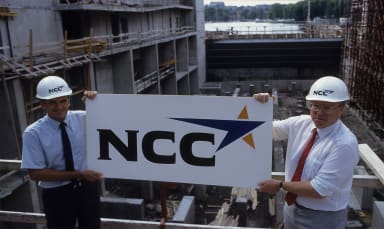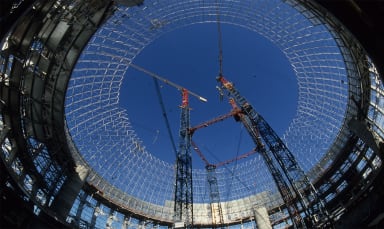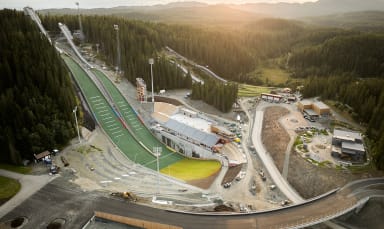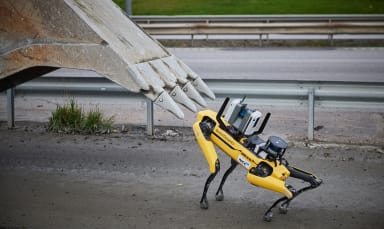Our history – turning visions into reality in the Nordic region since 1875
NCC has a rich history dating back to 1875. Through continuous innovation and competence development, NCC has evolved and taken on increasingly larger and more complex projects. Today, we continue to develop projects, processes, and expertise, and are well positioned to realize our customers' visions in an ever-changing world.

1875: A pioneer in asphalt
Nya Asfalt AB – one of the companies that form the foundation of NCC – is among the pioneers introducing asphalt in Sweden. As early as 1876, the first street in the country, Stora Nygatan in Stockholm, is paved. The photo shows paving work on the Lund–Dalby road section.
1928: Moving the Vigeland Committee’s monolith – world-class engineering
The Vigeland Committee, responsible for Gustav Vigeland’s sculpture park in Oslo, seeks bids in 1925 to transport a 266-ton granite block. Engineer Eeg-Henriksen offers to do the job for NOK 74,000 – far below the highest bid. The transport requires advanced engineering, including three-shift work and relocation of overhead lines. In August 1928, the stone is in place. Eeg-Henriksen, one of NCC’s Norwegian predecessor companies, has made a name for itself.


1954: Sweden’s first motorway
Motorways responded to the need for fast and safe transport. Sweden’s first motorway, built in concrete between Malmö and Lund, is completed in 1954. Several companies, including Svenska Väg AB – one of the companies that lay the foundation for NCC – participate in the construction. Design solutions improve traffic safety.
1958: The Ullevi stadium (New Ullevi) takes shape
Ullevi in Gothenburg, the largest event arena in the Nordics, is inaugurated in 1958. Among other events, it hosts the World Cup football semi-final between Sweden and Germany. SIAB’s expertise enables the arena’s unique curved design. SIAB is acquired by NCC in 1997.


1960: ABC center – a promise of the future
Farsta Centrum, south of Stockholm, is built as an ABC center, where people can work and live with close access to services. The area offers modern conveniences such as a metro to the city and heated sidewalks powered by nearby nuclear energy from Ågesta. The project is carried out in collaboration between several builders, including SIAB and Olle Engkvist – both of which later become part of NCC – and symbolizes optimism and modern urban planning.
1979: Millimeter paper and drafting film
Drawings for municipal facilities in Landskrona are being prepared at the ABV design office in Malmö in 1979. ABV later merges with JCC to form NCC. Planning and control are crucial to the success of construction projects, and the work is done using millimeter paper and drafting film. Twenty years later, the industry is revolutionized by virtual construction. The digital model becomes a tool for collaboration and quality throughout the construction process.


1980: Safety and precision in the construction of Olkiluoto nuclear power plant
Nuclear construction projects require exceptionally high safety standards. In Olkiluoto, western Finland, two reactors are built between 1974 and 1980 with very few operational disruptions. Svenska Väg AB, a predecessor to NCC, participates in the project alongside several Swedish and Finnish companies. The project demonstrates how meticulous planning, technical expertise, and cross-border collaboration are essential for success in complex and safety-critical infrastructure initiatives.
1988: NCC is founded – a Nordic construction company takes shape
In the spring of 1988, ABV and JCC merge to form Nordic Construction Company – NCC. With the ambition to take on increasingly large and complex projects across the Nordics, experience and capacity unite under a single name. A visual identity is developed, and NCC’s blue and yellow logo soon appears on construction sites, machinery, and offices nationwide.


1989: Globen (Avicii Arena) – a symbol of innovative construction
Globen in Stockholm is built between 1987 and 1989 by SIAB and ABV and completed under NCC’s direction. At the time, it is the world’s largest spherical building. The 85-metre-high arena, which holds up to 16,000 spectators, quickly becomes a city landmark. Twenty years later, NCC returns to build SkyView – two observation gondolas mounted on the outside of the dome. Globen symbolizes technical innovation and architectural boldness in Swedish construction.
1990s: Round trip to Gardermoen
NCC and its Norwegian subsidiary Eeg-Henriksen build Gardermoen Airport outside Oslo. The project requires special environmental considerations and management of multiple modes of transport. After successful delivery, NCC is entrusted with further expansion of the airport in 2012. High competence in concrete work and safe execution are highlighted as key success factors.


1997: A new collaboration format – Arlanda Express
The rail line between Stockholm and Arlanda Airport demands high reliability and energy efficiency. The project is carried out in collaboration between NCC and SIAB as Sweden’s first public-private partnership. It becomes an example of how new forms of collaboration can handle complex technical requirements.
2000: The Öresund Link – a project that unites
A heavily trafficked long underwater tunnel requires extensive safety planning. The tunnel section of the Öresund Link carries high-speed trains and heavy road traffic in both directions between Sweden and Denmark around the clock. NCC, in collaboration with Danish partners, is responsible for construction between 1995 and 2000.


2005: Turning Torso – an architectural icon
Turning Torso in Malmö, designed by Santiago Calatrava, is built by NCC between 2001 and 2005. With its 54 floors, the building becomes a landmark and a symbol of the city’s forward-looking spirit. The project demonstrates how architecture and engineering can merge in a unique residential building.
2010: A boost for sustainable construction
NCC launches Green Tenders to show that sustainable construction – for instance with lower energy consumption and reduced emissions – doesn’t have to be more expensive. Projects such as Kv. Klyvaren and the bridge at Rotebro in northern Stockholm become pioneers in climate-compensated construction. The initiative marks the beginning of more systematic environmental efforts in the industry.


2013–2015: The breakthrough of digitalization
VDC (Virtual Design and Construction) is established as a working method throughout the organization. Through 3D modelling, scheduling, and cost control, the construction process is digitalized. BIM (Building Information Modeling) becomes standard, and digital tools improve collaboration and efficiency.
2021–2023: Innovation and climate neutrality
NCC takes clear steps toward climate neutrality by introducing electric machinery, fossil-free transport, and climate calculations in projects. Pilot projects with zero-emission worksites are carried out, and partnerships with technology companies in smart cities and energy storage are established. Innovation becomes key to meeting both customer demands and climate goals.


2023: Granåsen Sports Park – a venue for sport and leisure
NCC finalizes Granåsen Sports Park – a facility offering resources for both elite sports and recreational activities. The sports park is designed with a focus on efficient operation and long-term usability and is an important part of the development of Granåsen as a center for sports and recreation.
2024: Kristianstad Water Treatment Plant – a high-efficiency solution for clean water
NCC completes the Kristianstad Water Treatment Plant, a facility that sets new standards for water purification. With advanced technology and efficient processes, the plant ensures clean water for the residents of Kristianstad. The new facility is also prepared for future requirements, such as pharmaceutical filtration.


2027: Nyt Hospital Nordsjælland – future healthcare in focus
Nyt Hospital Nordsjælland – one of Denmark’s most advanced healthcare facilities – begins construction in 2020 and is scheduled for completion in 2027. The hospital is designed with patient well-being at its core and offers modern facilities and technology. The project is the largest single construction project in the history of North Zealand.
Technology and learning lead us into the future
NCC is integrating AI and digital tools into production and planning. Automated resource optimization, AI-supported logistics, and digital twins are being used in several projects. By combining technology with continuous learning, we make better decisions and run projects more efficiently. This develops us as a company and creates long-term value for both customers and society – today and in the future.

Images without a credited photographer are part of NCC’s archive and are used with respect for their historical context.
